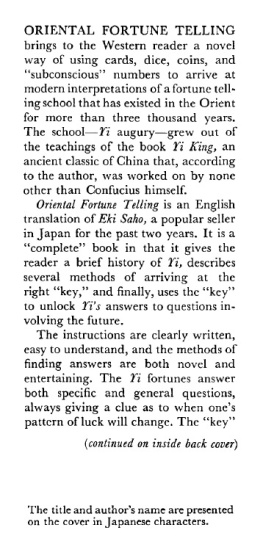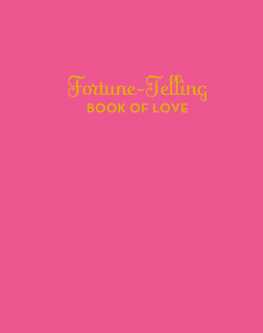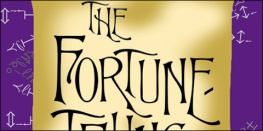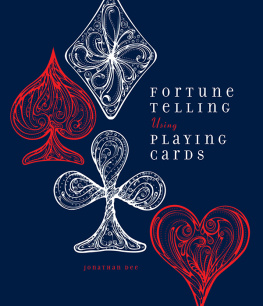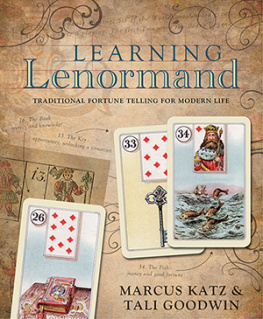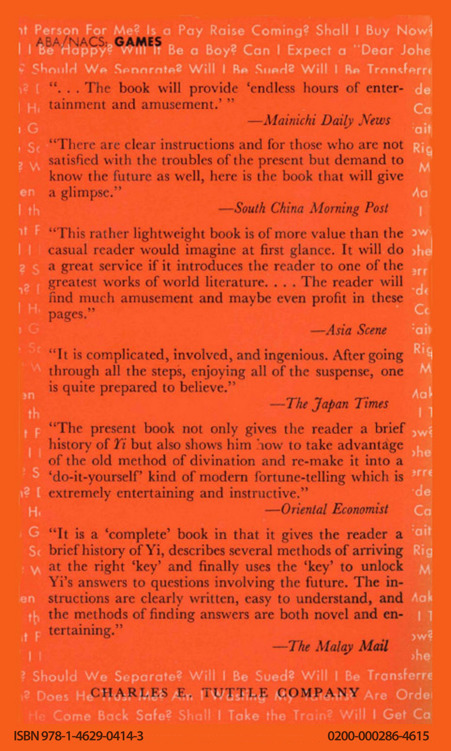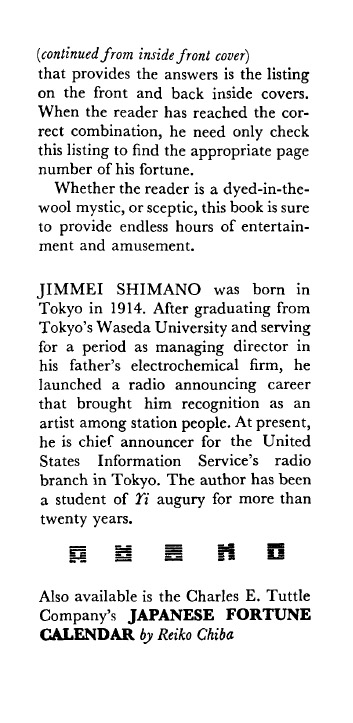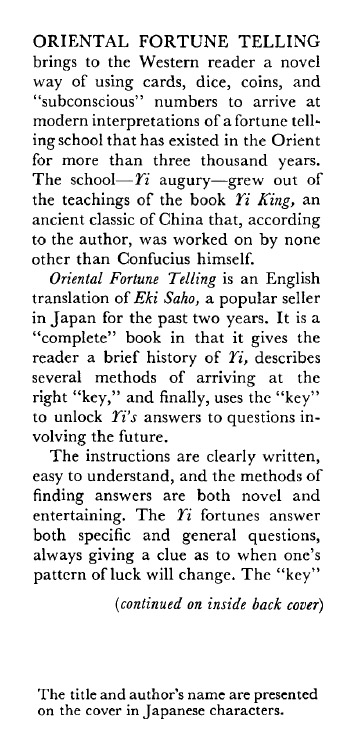Published by the Charles E. Tuttle Company, Inc.
of Rutland, Vermont & Tokyo, Japan
with editorial offices at Osaki Shinagawa-ku,
Tokyo 141-0032
1956 by Charles E. Tuttle Co., Inc.
Foreword
Yi augury tells cycles of good and bad luck
H AVE you ever thought of the mysterious tide of luck that carries you willy-nilly despite your own intentions?
At vital moments in your lifewhen starting on a new business, or making an important decisionwhat you need most is advice from friends, seniors, and others with much experience, sensibility and wisdom.
You may not need their advice when you are in a happy state, full of confidence in yourself.
But you cannot expect to be in such a state at all times, and heaven knows what misfortune may befall you just when you are reaching the height of your success. It might be a tragic accident or illness, or a business failure due to an economic recession, or a serious mistake in negotiations, or a misunderstanding in human relations. Such misfortunes may happen to you because you are subject to a cycle of good and bad luck.
A man taking pride in his robust health may suddenly contract a fatal disease, and a long-time pauper may suddenly come into riches.
Just as there are business cycles in the economy, so are there alternating periods of good and bad luck in the life of everyone.
A seemingly happy man who has never known any want of money may have a hidden complex about his fate, which, he vaguely knows, is beyond his control.
When you are at the bottom of your cycle of luck, there is no use struggling to go up, for you will merely bog down deeper.
At such moments, it would be far better to stay just where you are, grasping whatever straw you may find within reach to keep your head above water and catch a breath, waiting until you recover enough strength to ride upward on the next surge of your luck.
Yi augury tells you when the next wave of your luck is forthcoming, and helps you immeasurably in making up your mind about whatever problem or doubt you may have.
A history of three thousand years in China
Three millenniums ago, the ancient Chinese developed Yi augury on the basis of what they saw and experienced in life. Starting with two basic elementspositive and negative, representing "Heaven" and "Earth" respectivelythey divided all things in the universe into 11,520 forms, covering everything from celestial and earthly phenomena to architecture, agriculture, human affairs, and art. These were grouped into 64 types (subdivided into 384 variations), and each was represented by a combination of elements, which stood for a particular kind of possibility in life. The whole system of augury based on this theory was compiled into the Book of Changes (Ti King), a philosophical work as well as the sacred book for all Yi augurs. It was completed through the efforts of one of the four greatest sages of the world, Confucius, and supplemented by another wise man of the Orient, Mencius (B.C. 372-289).
Four new methods of divination
To the modern mind, augury may appear somewhat outmoded and impractical. Indeed, many people who have had disappointing experiences with irresponsible fortunetellers on the street are inclined to think that Yi augury has at best only a fifty-fifty chance of telling the truth. But it must be admitted that there is now a world-wide revival of interest in Yi augury, and that more and more people are coming to believe that this form of fortune telling based on the 3,000-year-old philosophy of the Book of Changes can be used effectively in the life of any sensible man living in the twentieth century.
If you turn to Yi augury when you are unlucky, the answer it provides will reflect your unlucky state and seldom predict an immediate happy turn. But you can draw a useful guide from what it tells you, and learn how soon your luck will returnhow long you will have to wait before you enter the next upward phase of your cycle of luck.
The present book is intended to help you do just that. It presents, in addition to the old practices known in Yi augury, four original methods developed by myself: how to tell fortunes (1) with five coppers and one silver, (2) with a pair of dice, (3) with twenty-four cards, and (4) with "subconscious numbers." Choose any one of them best suited for you. They are all based on the same theory of Yi augury and will give you the same reliable answer.
It is my hope that this book will be a useful guide to you in making decisions and plans in business, in developing new ideas, in forming prospects about your sales, negotiations, travelling, health, marriage, dates, money making, stock and other market investments, and in finding your way in everything else, giving you invaluable advice and answering all your questions.
For your convenience, a ready guide to your fortune appears on the front and rear end-papers of this book. After you have learned to arrive at one of the combinations that will lead you to your fortune, you will find it listed on either the front or back end-papers, along with the appropriate page number.
In my opinion, the four years following September, 1965, will be a period of change throughout the world, with such occurrences as major natural phenomena, deaths of world leaders, and a complex mixture of prosperous times and crises.
It is in an era like this that Yi augury should be fully utilized, and will prove most useful to anyone who has faith in it.
Jimmei Shimano
| Chapter One |  |
Yi Augury and Your Changing Cycles of Luck
Y OU perhaps have experienced at some juncture in your life that things simply wouldn't go as you wished them to, that every move you made turned out to be exactly the opposite of what you should have done. At such times, your luck was on the wane.
At other times, you may have seen things going exceedingly well, as if all the forces in the universe had been working together to bring you success, giving you the conviction that Fortune was smiling on you. Indeed she was, for your luck was on the rise.
How helpful it would be if you could learn where in this cycle of good and bad luck you now stood. You would then be able to prepare yourself accordinglyto emerge from a period of bad luck with minimum loss, and to maximize your gains in the next lucky period.

